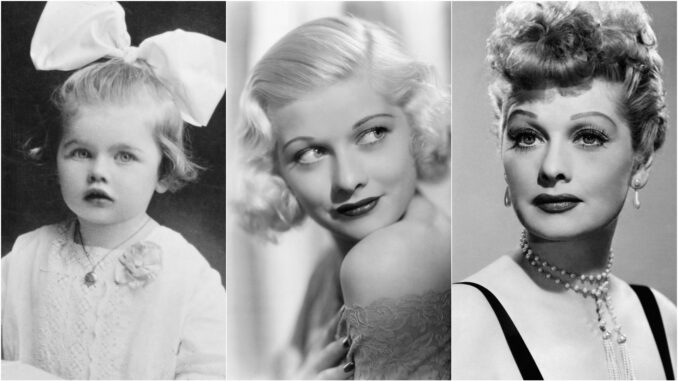
Why Lucille Ball Took a Financial Loss for the Role of a Lifetime
Lucille Ball is one of television’s most celebrated icons, thanks to her groundbreaking role in I Love Lucy. But did you know she took a significant financial hit to bring the beloved sitcom to life? Her decision wasn’t just about money—it was about creative control, legacy, and love. Let’s dive into the remarkable story behind her iconic decision.
The Birth of a Sitcom Legend
Lucille Ball’s Rising Stardom Before I Love Lucy
Before stepping into the role of Lucy Ricardo, Lucille Ball was already a successful actress in Hollywood. Her film career spanned over two decades, and she earned a reputation as a comedic genius. But while her talent was undeniable, Ball was often cast in secondary roles, leaving her yearning for more substantial opportunities.
Desi Arnaz and the Dream of Working Together
Lucille’s husband, Desi Arnaz, was a Cuban-American bandleader and actor. The couple’s demanding schedules frequently kept them apart. To solve this, Ball envisioned a television project that would allow them to work together while showcasing their undeniable chemistry.
The Road to I Love Lucy Wasn’t Easy
Convincing CBS to Cast Arnaz
In the 1950s, executives were skeptical about casting a mixed-race couple on TV. Ball and Arnaz faced resistance from CBS, which doubted the pair’s marketability. The couple decided to take matters into their own hands, producing a vaudeville-style tour to prove their comedic chemistry worked. Their success on the road convinced CBS to greenlight I Love Lucy.
Why Lucille Ball Opted for Creative Control
Lucille Ball understood the value of creative freedom. Alongside Arnaz, she insisted on retaining the rights to the show under their production company, Desilu Productions. This unprecedented move in television history allowed them to have a say in scripts, casting, and filming.

The Financial Trade-Off
Why the Deal Wasn’t Lucrative at First
To secure creative control, Lucille and Desi agreed to a lower upfront salary. CBS retained network distribution rights, while Desilu handled production costs. For the couple, this meant taking on significant financial risk.
The Long-Term Vision
Ball and Arnaz gambled on the show’s success. They understood that owning the rights to the show could pay off in the long run. This decision would later revolutionize television syndication, making them pioneers in the industry.
Filming I Love Lucy: Breaking New Ground
Innovations in Television Production
Ball and Arnaz introduced a multi-camera setup and live audience filming. This method not only enhanced the comedic timing but also set the standard for sitcom production for decades to come.
A High-Stakes Gamble
Producing I Love Lucy came with high costs. From hiring top writers to renting state-of-the-art equipment, the couple spared no expense. Every decision was a calculated risk to ensure the show’s success.
The Show’s Unprecedented Success
America’s Sweetheart and the Power of Relatability
Lucy Ricardo’s antics resonated with audiences across the nation. Whether she was stomping grapes in Italy or scheming her way into Ricky’s nightclub act, Ball’s comedic brilliance captured hearts.
Breaking Ratings Records
Within months of its debut in 1951, I Love Lucy became a cultural phenomenon. It regularly topped Nielsen ratings, proving Ball and Arnaz’s vision right.
The Payoff: From Financial Risk to Historic Success
Syndication: The Goldmine of Reruns
When I Love Lucy ended its original run, its reruns became a massive revenue stream. The couple’s decision to retain ownership of the show paid off exponentially, cementing their financial legacy.
Desilu Productions: A TV Empire
Desilu Productions grew into a powerhouse, producing iconic shows like Star Trek and The Untouchables. Lucille Ball’s entrepreneurial spirit paved the way for women in leadership roles in Hollywood.
Lucille Ball’s Legacy in Television
A Trailblazer for Women in Entertainment
Ball shattered barriers as a female comedian, producer, and businesswoman. Her willingness to risk financial stability for creative control inspired generations of performers.
Why the Decision Still Resonates Today
Lucille Ball’s journey is a testament to the power of passion over profit. She prioritized her artistic vision and personal happiness, proving that sometimes taking a financial loss can lead to invaluable rewards.
Conclusion
Lucille Ball’s decision to take a financial loss for I Love Lucy wasn’t just a business move—it was a leap of faith. By prioritizing creative control and her partnership with Desi Arnaz, she reshaped television history. Her sacrifice paid off in ways that money could never measure, leaving behind a legacy that continues to inspire.
FAQs
1. Why did Lucille Ball agree to take a financial loss for I Love Lucy?
Lucille Ball valued creative control and wanted to work alongside her husband, Desi Arnaz. She believed the long-term benefits of owning the show outweighed the initial financial risks.
2. How did I Love Lucy impact Lucille Ball’s career?
The show made Ball a household name and cemented her status as one of the greatest comedic talents in television history.
3. What innovations did I Love Lucy bring to TV?
The show popularized the multi-camera setup and live audience format, setting the standard for modern sitcoms.
4. Did Lucille Ball’s gamble on I Love Lucy pay off?
Yes! Syndication royalties and the success of Desilu Productions turned their financial risk into a monumental success.
5. What is Lucille Ball’s lasting legacy?
She is remembered as a trailblazing comedian, producer, and entrepreneur who reshaped television and inspired countless entertainers.